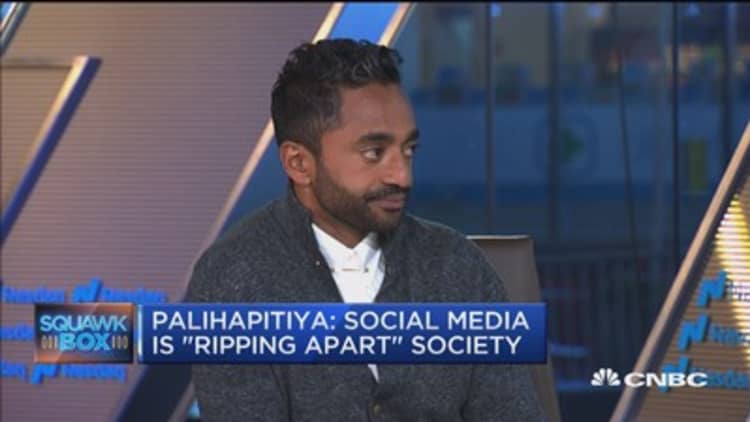Social media has been the big driver of tech sector growth over the last decade, but questions over its effect on children's mental health are on the rise. Even Silicon Valley gurus are stopping or reducing time spent online by their kids.
Caroline Knorr, the senior parenting editor at commonsense.org, spends much of her time addressing cyberbullying and excessive screen time. She told CNBC that tech addiction is no accident.
"Most social media platforms are designed to psychologically hook kids at a life stage where they are extremely vulnerable to peer approval," she added via email.
"So we want to encourage awareness around the tricks app companies use to make kids feel as though they have to check in all the time."
In a 2016 study of American families, commissioned by commonsense.org, it was found that media and technology use was a source of tension for many families and that people were struggling to focus due to frequent demands of social media and other online communication.
There is some evidence that young people are already recognizing the dangers and voluntarily choosing to switch off. In the U.K., a 2017 survey of nearly 5,000 school students claimed that young people are rebelling against the current state of social media.
The findings, released in October, suggested almost two-thirds of children between 11 and 18 years old wouldn't mind if social media had never been invented. Respondents said abusive comments, worries about addiction and increased insecurity about appearance were all reasons to take a break from online interaction with others.
And a further survey by the U.K.'s Royal Society for Public Health, released in April, identified Instagram as the worst offender for upsetting young people's mental health.
One respondent to the #StatusOfMind survey said: "Instagram easily makes girls and women feel as if their bodies aren't good enough."
At the time a spokesperson for Instagram said keeping the site a safe and supportive place is "a top priority, particularly when it comes to young people".
The survey asked to what extent each of the social media platforms they use made health-related factors better or worse.
Other net-negative platforms were Snapchat, Facebook, and Twitter, while YouTube stood alone in having a net positive effect on a user's perception of well-being.
The society's chief executive, Shirley Cramer, said social media needed to be "less of a Wild West" when it came to young people's mental health.
Social slowdown?
Bald statistics would have you believe that the growth of social media continues unchecked. As of the third quarter of 2017, Facebook had 2.07 billion monthly active users (MAU's). Active users are those which have logged in to Facebook during the last 30 days.
That marks a phenomenal rise since the third quarter of 2008 when just 100 million MAU's were attributed to Mark Zuckerberg's company.
Delve a little deeper under Facebook's hood and a picture of slowing growth can be detected. According to eMarketer data, 31 percent of internet surfers in 2012 logged on to Facebook at some point. By 2017 that figure had jumped to almost 45 percent. But fast forward to projections for 2021 and eMarketer believes the growth will rise by only a further 2 percent.
For Twitter, eMarketer estimated its percentage of internet users will actually fall below 7 percent by 2021.
There's an app for that
There are even apps to help people stop, or at least slow, the amount of time spent tapping, liking and scrolling.
One app called Offtime helps users unplug by blocking distracting software and informing people how much time they are spending on a particular site. Another, titled Moment sets caps on the amount of social media time you are allowed each day. Override it and you are flooded with annoying alerts.
The role of social media is also being criticized at a geo-political level as accusations fly that the internet is being manipulated to disrupt campaigns and elections.
Facebook said in September that it had found an operation, probably based in Russia, which spent $100,000 on adverts promoting divisive social and political messages over a two-year period.
It argued however that there had been no link to the most recent U.S. general election.

But the former Facebook executive Chamath Palihapitiya told CNBC earlier this month that social media is manipulating society, allowing popularity to replace truth.
"The tools that we have created today are starting to erode the social fabric of how society works," he said.
Palihapitiya said social media exploits a human need for feedback, which in chemical terms, was the release of dopamine in your brain.The tech leader said his own children receive no screen time whatsoever.
After complaints from Facebook, Palihapitiya later of his former employer, calling it "a force for good."
Sean Parker, Facebook's founding president, is another who claims that the social media platform could be harmful.
"The unintended consequences of a network when it grows to a billion or 2 billion people ― it literally changes your relationship with society, with each other," Parker said at an Axios event last month.
"God only knows what it's doing to our children's brains," he added.
In December, Facebook made a statement said it was working "to understand the effects of our service on well-being, and we're using it to inform our product development."


